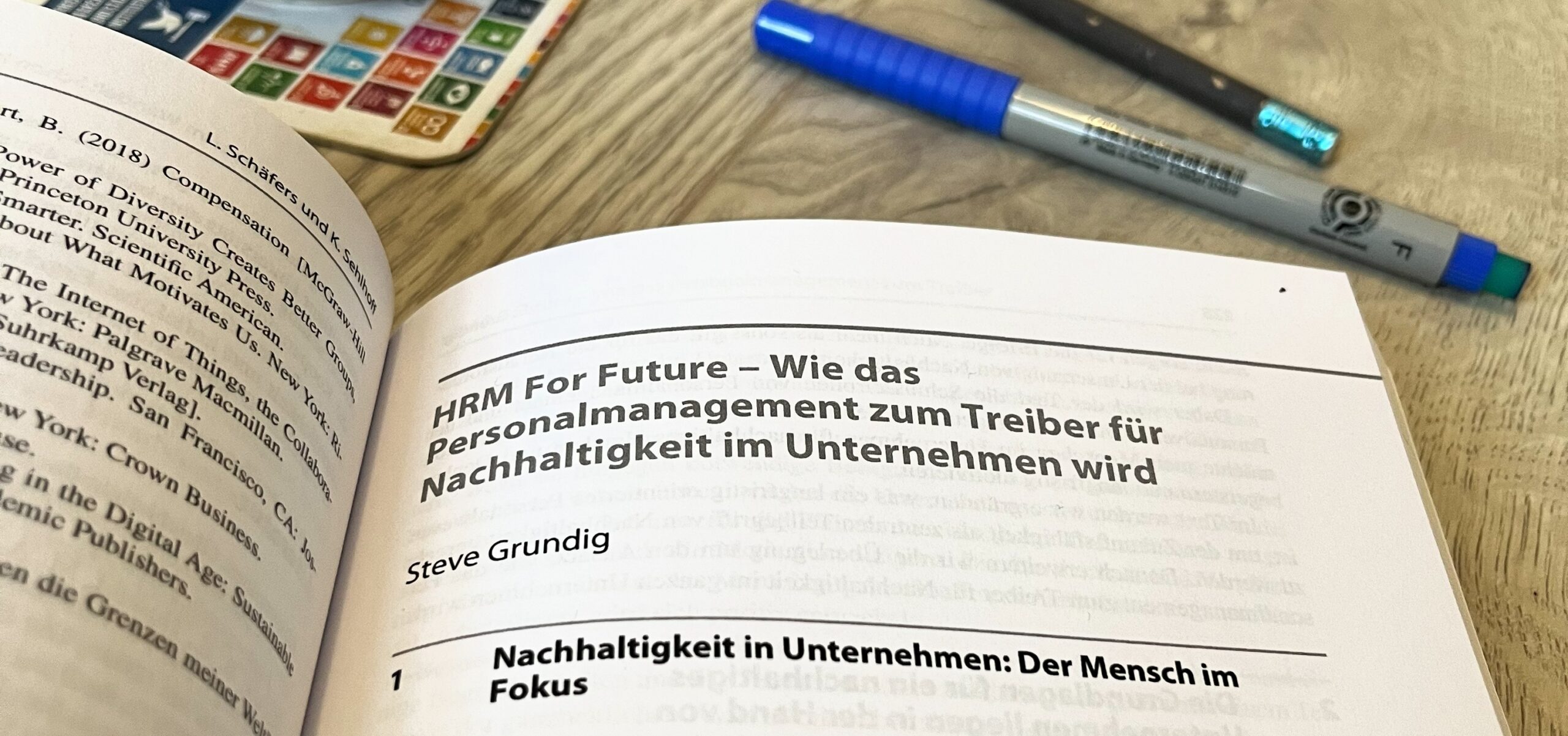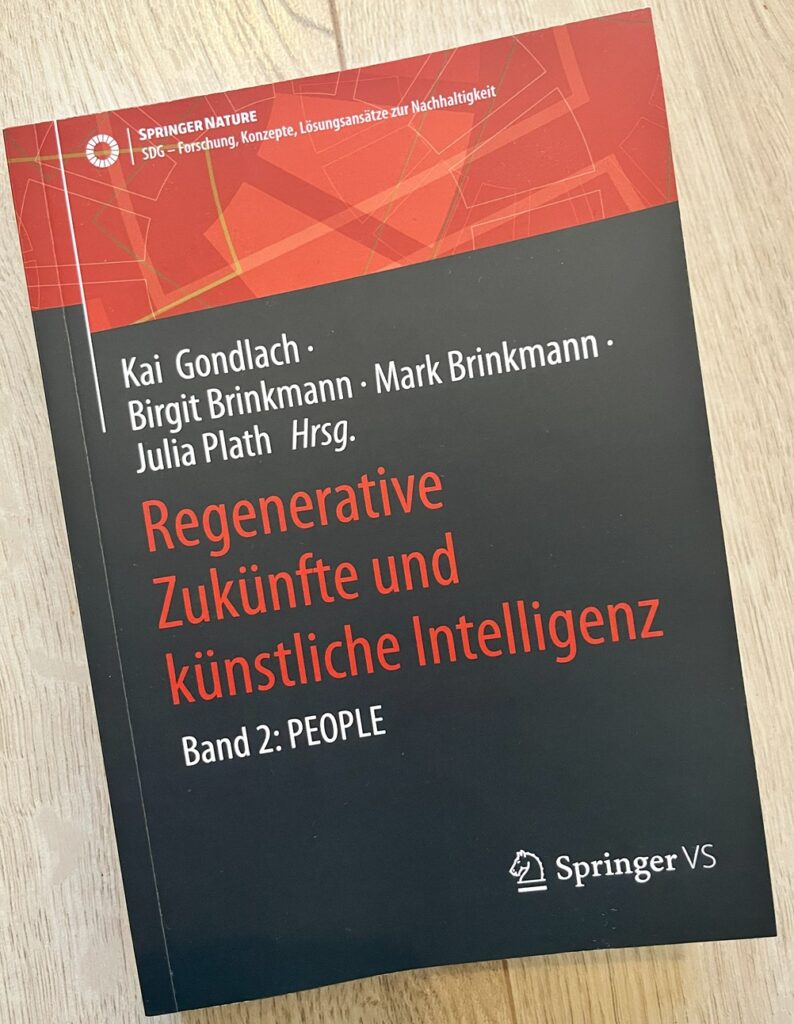The following article analyses the The role of human resources management (HRM) in the transformation of companies towards greater sustainability. Thereby "sustainable human resources management" and "HRM For Future" in the sense of human resources management for sustainability. While the former is aimed at the future-oriented handling of human resources, "HRM For Future" acts as a strategic driver for sustainable corporate development. Author and sustainability consultant Steve Grundig argues, that HR managers play a key role through their direct influence. To this end, targeted competences for sustainable action must be developed and a corresponding corporate culture established. The book also identifies five key foundations for successful implementation: understanding, resources, knowledge, exchange opportunities and corporate culture.
The following text is an excerpt from the book article "HRM For Future - How HR management is becoming a driver for sustainability in companies" published in 2025 by Steve Grundig (sustainability consultant at plant values).
- HR management as a driver for sustainability in the company
- Using HR tools for sustainable change
- Motivation and empowerment as personnel drivers of sustainable change
- Further texts and contributions
The full article was published in the anthology "Regenerative Futures and Artificial Intelligence | Volume 2: PEOPLE" by Springer Fachmedien Verlag. The editors are Kai Gondlach, Birgit Brinkmann, Mark Brinkmann and Julia Plath. (Order here)
HRM For Future - HR management as a driver for sustainability in the company
(Text excerpt, slightly modified)
It has been shown that numerous new needs and challenges arise for employees and managers in sustainable corporate development. HR management has the task of regularly recording these needs, identifying challenges and providing appropriate programmes. It is important to prepare people for the change towards sustainability and to give them the skills and competence to act. This enables people to really implement sustainability in the company. Ideally, this happens in a corporate culture of sustainability. The topic "Sustainable corporate culture" with its function and how its structure worksis worthy of dedicated consideration. However, in the context of this publication, reference should only be made to the linked Technical contribution referred to.
Using HR tools for sustainable change
Both innovative and traditional HR management tools must be utilised. For example, further training programmes, virtual learning environments (eLearning), restructuring of tasks and areas of expertise or new hires for the new areas of responsibility. It is crucial that these instruments are now consistently geared towards sustainability in the company, i.e. its core business. It must not just be about making business operations, e.g. administration, day-to-day operations, drinks and fruit in the office, commuter mobility, (more) sustainable. The core business itself, i.e. the business model, the services and products offered, must be geared towards sustainability. This requires the people in the company with their day-to-day actions and tactical and strategic decisions towards sustainability. And it requires their motivation and expertise.
Motivation and empowerment as personnel drivers of sustainable change
Motivated people are more open to change, more able to withstand uncertainty and show more commitment. They are also less likely to be discouraged by setbacks and show greater stamina when faced with ongoing tasks. These are each important prerequisites for the successful implementation of sustainability. Motivational measures can be analytical, creative or based on playful interaction.
Empowerment is important because employees can only respond appropriately to the challenges of sustainable change if they have the relevant knowledge and expertise. A lack of empowerment will result in wrong decisions or an inability to act. Both lead to frustration and harbour the risk of sustainability failing completely. A detailed discussion of the aspects of empowerment and motivation of employees in companies, including concrete measures as inspiration, are part of another specialist article, which is linked here.
HRM is permanently required to ensure sustainable development within the company
The long-term task for the implementation of sustainability in HR management is, on the one hand, to establish appropriate personnel structures. On the other hand, suitable people (sustainability talents) must be found and existing staff must be promoted. The keywords here are recruiting, promotion and advancement. In particular, the necessary competences for sustainable corporate development must be communicated - i.e. clarifying what is needed now and in the future for sustainability in the core business.
The aim must be to identify the tasks identified, translate them into specific needs and measures for the company and implement them successfully. This is followed by a performance review and a new needs assessment so that the competences for sustainability can be trained on a permanent basis. It is now up to HR management and HR managers to lay the decisive foundations to act as a driver for sustainability throughout the company.
The above text is an excerpt from the book article "HRM for Future - How HR management is becoming a driver for sustainability in companies" published in 2025 by Steve Grundig (sustainability consultant at plant values).
The full article was published in the anthology "Regenerative Futures and Artificial Intelligence | Volume 2: PEOPLE" by Springer Fachmedien Verlag. The editors are Kai Gondlach, Birgit Brinkmann, Mark Brinkmann and Julia Plath. (Order here)
Related and referenced articles:
- Kirschten, U. (2021). "Sustainable transformation processes in companies." In Publication series Sustainability management in Saxon companies.
- Sutter, G.-S. (2015). "CSR without HR is PR - People make the difference." In Schneider, A., & Schmidpeter, R. (Eds.), Responsible corporate management in theory and practice (pp. 647 ff).
- Sutter, G.-S. (2018). "CSR without HR is PR." Environmental dialogue. Available at: www.umweltdialog.de/de/management/personalmanagement/2018/CSR-ohne-HR-ist-PR.php , retrieved on 14 July 2023.
- Kiel, T. (no year). "What makes sustainable companies?" plans values blog. Available at: www.plant-values.de/was-macht-nachhaltige-unternehmen-aus


